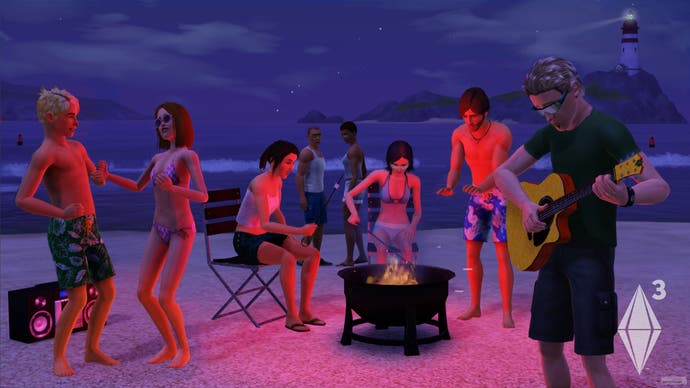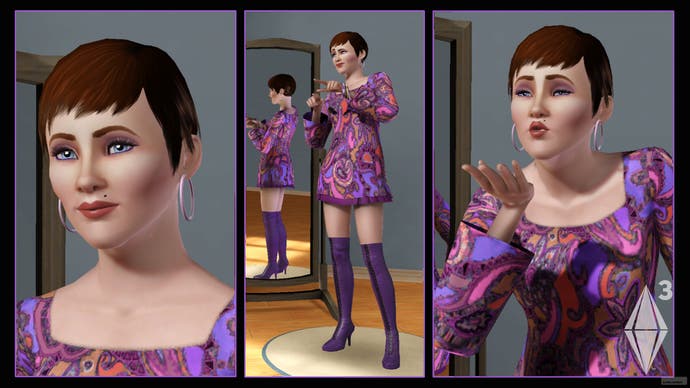The Sims 3
Acting on Simpulse.
It's a moment of strange and joyous freedom. I've created my two Sims, the lovely married couple of John Walker (lazy, slobbish, neurotic - and in the game!) and She-Hulk (athletic, flirtatious and a kleptomaniac - guaranteeing me outrage from Shulkie fans for my out-of-character characterisation). They're in their house. All is well. It's The Sims.
And then, with a scroll and a click, I send She-Hulk running across the road to start seducing the neighbours, while John watches helplessly. It's something that I've wanted to do ever since laying down my first piece of virtual furniture, and something that all Sims games have prevented me from doing with their my-home-is-my-level system where all the places in town were their own little places, requiring tedious loading to get between. With Sims 3, the camera pans back. Of all the changes in the game - and there's really a lot of fun technical stuff here, involving sharing content and all that - it's this which excites me most. It's no longer a life simulator that believes the house is the atomic level; it's a life simulator that believes the town is.
Assistant producer MJ Chun doesn't quite agree with the life simulator argument. "For me, The Sims is more inspired by life than a life simulator," she laughs. "You should get off your butt and live your life. It's ultimately a game... just not a zero-sum game. It's more about - and especially Sims 3 - who you are as a player rather than the game itself. So it doesn't come to life until someone starts playing it. Maybe they're a griefer - that's what we call someone who likes to mess around with their Sims. Or maybe you're really into the creativity and customisation. Maybe you want to take video. And ultimately it has to have really compelling gameplay.
"Sims 3 I love because it's a little bit directed, and it feels strategic playing it - because my Sims will go, 'I want to go to the park!', and I can fulfill that wish - which takes time - or not. And then there's their moods - as in, they may be hungry. A little peckish. And I'll go, 'I'll have you work out for a little longer, and in the long term it's a big payoff.'" This is, of course, wisdom the portly Eurogamer staff have never truly grasped. Picking up from The Sims 2, it's the character's desires and objectives that give the game its strategic direction. Depending how you create your character, you have a life goal - but you also have those transitory desires you can choose to pursue or ignore. "For me, it's like New Year's Eve," says Chun. "Everyone has that long-term resolution, 'I'm going to get fitter this year.' Or maybe it's a life goal. And the medium term goal is, 'I want to run a marathon.'" Eurogamer, of course, only goes as far as, "I want to eat a marathon."

In terms of actual Sims' nature though, the core of the game is the personality traits, which replace the statistic-tweaking of the first. "I spend a lot of time talking about the personality traits, because I think that's the heart of Sims 3," argues Chun. So rather than spending points in characteristics, with you ending up as Lazy or Energetic depending how many you spend in the category, you choose up to five attributes, each of which has a distinct effect on a sim's personality. Rather than the fuzziness, things now have clean edges. "The cool thing is that we're not making value judgments about anything," says Chun. "You can be evil, and not feel bad. That's something which is very Sims. We're giving the same level of importance to being Friendly or Lucky, being a Snob or being a Vegetarian.
"One of our favourites is 'Never Nude'. The Sim will never ever be totally nude. Or there's [being] a Perfectionist. And now we can have a friendly, lucky Vegetarian who's Never Nude and happens to be a Perfectionist." In other words, if you want to make a superman, go for it. If you want a freak who never leaves the house or changes his clothes, knock yourself out. Each choice will lead to a different experience. "Some people are going to be totally trying to min/max their characters," says Chun. "As in, this is the long-term gameplay I want, so I'm going to go for the charismatic, the genius. And some people are going to go for the storytelling." By which she means stuff for fun's own sake.

"We wanted the traits to make sense," she says. "It's really frustrating for me as a player to play a game where there are constraints and rules which don't really seem to make sense. You'll never be able to pick someone who hates children and likes children. But we do have neurotic. It doesn't make sense for someone to be contradictory. And the best part, it's really holistic. We'll play the game and give feedback.
We can tell our designers that it's really weird that there's a vegetarian sim who autonomously eats hotdogs and he'll go, 'That's a bug.'" Or an accurate model of the usual no-really-I'm-a-vegetarian.








